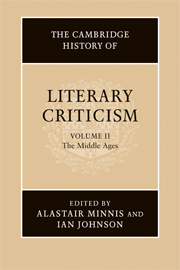Book contents
- Frontmatter
- Introduction
- I THE LIBERAL ARTS AND THE ARTS OF LATIN TEXTUALITY
- II THE STUDY OF CLASSICAL AUTHORS
- 5 From late Antiquity to the twelfth century
- 6 FROM THE TWELFTH CENTURY TO c. 1450
- III TEXTUAL PSYCHOLOGIES: IMAGINATION, MEMORY, PLEASURE
- IV VERNACULAR CRITICAL TRADITIONS: THE EARLY MIDDLE AGES
- V VERNACULAR CRITICAL TRADITIONS: THE LATE MIDDLE AGES
- VI LATIN AND VERNACULAR IN ITALIAN LITERARY THEORY
- VII BYZANTINE LITERARY THEORY AND CRITICISM
- Bibliography
- Index
- References
5 - From late Antiquity to the twelfth century
from II - THE STUDY OF CLASSICAL AUTHORS
Published online by Cambridge University Press: 28 March 2008
- Frontmatter
- Introduction
- I THE LIBERAL ARTS AND THE ARTS OF LATIN TEXTUALITY
- II THE STUDY OF CLASSICAL AUTHORS
- 5 From late Antiquity to the twelfth century
- 6 FROM THE TWELFTH CENTURY TO c. 1450
- III TEXTUAL PSYCHOLOGIES: IMAGINATION, MEMORY, PLEASURE
- IV VERNACULAR CRITICAL TRADITIONS: THE EARLY MIDDLE AGES
- V VERNACULAR CRITICAL TRADITIONS: THE LATE MIDDLE AGES
- VI LATIN AND VERNACULAR IN ITALIAN LITERARY THEORY
- VII BYZANTINE LITERARY THEORY AND CRITICISM
- Bibliography
- Index
- References
Summary
The history of medieval literary studies properly begins in the early fourth century, and is heralded by a renewal of interest in the study of the great Latin writers of the past. With the exception of Horace's Ars poetica, the major texts of ancient literary criticism seem to have been little known during this period, and critical activity is largely confined to commentaries directed to teachers and students of grammar and rhetoric. It was in the classroom that the emergent Christian culture came to terms with its pagan heritage, and the negotiations this involved largely determined the shape of education and literary criticism throughout the medieval period.
The role of the great Latin authors of the republic and early empire in preserving the authority of ancient culture during the third and fourth centuries is hard to overestimate. The study of literature had always been an important part of the imperial system of education, and the prestige of literary culture seems to have grown during this period. In the face of the growing influence of Christian apologists sceptical of all pagan institutions, education became an important preserve of national culture, and literature was increasingly valued as a repository of ancient traditions of all kinds. The later fourth century is an important time in the history of commentary on classical texts and of textual criticism, and Virgil, Livy and other major figures seem to have enjoyed in some circles a virtual cult status.
- Type
- Chapter
- Information
- The Cambridge History of Literary Criticism , pp. 97 - 144Publisher: Cambridge University PressPrint publication year: 2005
References
- 1
- Cited by



